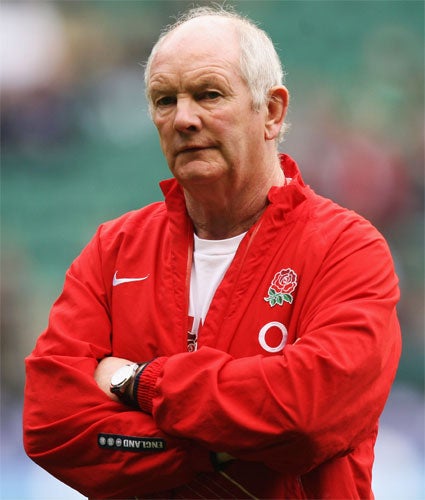RFU finally admit to getting it wrong over sacking of Ashton

They took a long time getting there – two years in which they have seen the England team slip to seventh in the world rankings with a lamentable win rate of 38 per cent under Martin Johnson – but the Rugby Football Union hierarchy finally acknowledged yesterday, albeit tacitly, that the decision to sack Brian Ashton as head coach after the 2008 Six Nations Championship might have been flawed.
"There is a perception that we've been harsh in the past," admitted Martyn Thomas, the chairman of the governing body. "Perhaps you'll credit us with being gentler in the future."
Thomas, one of the individuals most heavily implicated in Ashton's demise and the establishment of the Johnson regime, did not budge an inch in his support of the current manager, despite a record of three victories from eight outings this season, with the prospect of more pain to come in Australia this summer. "Martin has put in place a discipline that, rightly or wrongly, we felt wasn't there in the past," he said. "He has also demonstrated a loyalty to the players and the coaching staff. From where we sit, he's doing a good job. He is contracted until the 2011 World Cup in New Zealand and he has the absolute backing of the board, the executive... everyone, as far as I'm concerned."
But the chairman was forced to concede that Johnson's failure to match his predecessor in the hard currency of international achievement had led the RFU to apply different standards to this management team than those of Ashton or Andy Robinson, who succeeded the World Cup-winning Clive Woodward in 2004. Thomas is showing far more patience now than he did two years ago: no great surprise, given that his personal fortunes are linked so closely to those of the current England set-up.
Not that he gave the manager a completely free ride yesterday. Thomas repeatedly asserted that Johnson, and Johnson alone, was in charge of the national team, and that he had hiring and firing powers over the coaching staff. In saying this, he eased some of the pressure on Rob Andrew, the director of elite rugby at Twickenham, who has been the target of fierce criticism since the end of the Six Nations, not least from those who would like to see Woodward take over his job.
"We've said this before but it doesn't seem to get through: it's not Rob's job to manage the England team," Thomas insisted. "He works across all the representative sides, and while the senior team is always the focus of attention, there have been a fair few successes elsewhere. The under-18s haven't lost since 2007.
"There is no vacancy in the elite rugby department, we have no plans to review that department and there have been no discussions, formal or informal, with Clive. He has a role with the British Olympic Association as it moves towards London 2012 and in fairness, it must cause him some difficulties when he walks in every day with his bosses reading that he's leaving, which isn't the case."
Join our commenting forum
Join thought-provoking conversations, follow other Independent readers and see their replies
Comments